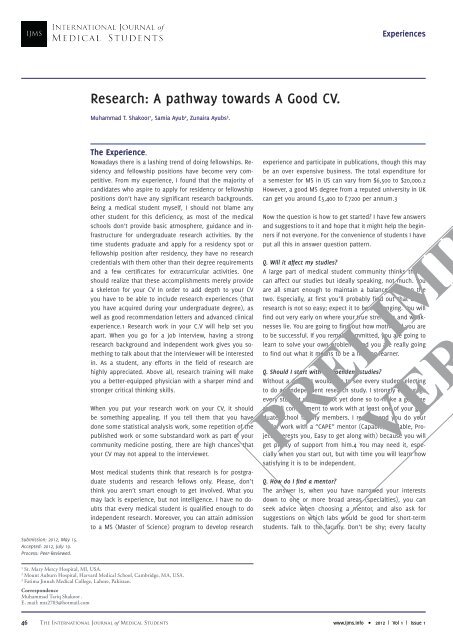Year 2012 - Volume 1 - Issue 1 - IJMS
Year 2012 - Volume 1 - Issue 1 - IJMS
Year 2012 - Volume 1 - Issue 1 - IJMS
You also want an ePaper? Increase the reach of your titles
YUMPU automatically turns print PDFs into web optimized ePapers that Google loves.
46<br />
<strong>IJMS</strong><br />
Submission: <strong>2012</strong>, May 15.<br />
Accepted: <strong>2012</strong>, July 19.<br />
Process: Peer-Reviewed.<br />
International Journal of<br />
Medical Students<br />
1 St. Mary Mercy Hospital, MI, USA.<br />
2 Mount Auburn Hospital, Harvard Medical School, Cambridge, MA, USA.<br />
3 Fatima Jinnah Medical College, Lahore, Pakistan.<br />
Correspondence<br />
Muhammad Tariq Shakoor .<br />
E. mail: mts2703@hotmail.com<br />
Research: A pathway towards A Good CV.<br />
Muhammad T. Shakoor 1 , Samia Ayub 2 , Zunaira Ayubs 3 .<br />
The Experience.<br />
Nowadays there is a lashing trend of doing fellowships. Residency<br />
and fellowship positions have become very competitive.<br />
From my experience, I found that the majority of<br />
candidates who aspire to apply for residency or fellowship<br />
positions don’t have any significant research backgrounds.<br />
Being a medical student myself, I should not blame any<br />
other student for this deficiency, as most of the medical<br />
schools don’t provide basic atmosphere, guidance and infrastructure<br />
for undergraduate research activities. By the<br />
time students graduate and apply for a residency spot or<br />
fellowship position after residency, they have no research<br />
credentials with them other than their degree requirements<br />
and a few certificates for extracurricular activities. One<br />
should realize that these accomplishments merely provide<br />
a skeleton for your CV In order to add depth to your CV<br />
you have to be able to include research experiences (that<br />
you have acquired during your undergraduate degree), as<br />
well as good recommendation letters and advanced clinical<br />
experience.1 Research work in your C.V will help set you<br />
apart. When you go for a job interview, having a strong<br />
research background and independent work gives you something<br />
to talk about that the interviewer will be interested<br />
in. As a student, any efforts in the field of research are<br />
highly appreciated. Above all, research training will make<br />
you a better-equipped physician with a sharper mind and<br />
stronger critical thinking skills.<br />
When you put your research work on your CV, it should<br />
be something appealing. If you tell them that you have<br />
done some statistical analysis work, some repetition of the<br />
published work or some substandard work as part of your<br />
community medicine posting, there are high chances that<br />
your CV may not appeal to the interviewer.<br />
Most medical students think that research is for postgraduate<br />
students and research fellows only. Please, don’t<br />
think you aren’t smart enough to get involved. What you<br />
may lack is experience, but not intelligence. I have no doubts<br />
that every medical student is qualified enough to do<br />
independent research. Moreover, you can attain admission<br />
to a MS (Master of Science) program to develop research<br />
Experiences<br />
experience and participate in publications, though this may<br />
be an over expensive business. The total expenditure for<br />
a semester for MS in US can vary from $6,500 to $20,000.2<br />
However, a good MS degree from a reputed university in UK<br />
can get you around £5,400 to £7200 per annum.3<br />
Now the question is how to get started? I have few answers<br />
and suggestions to it and hope that it might help the beginners<br />
if not everyone. For the convenience of students I have<br />
put all this in answer question pattern.<br />
Q. Will it affect my studies?<br />
A large part of medical student community thinks that it<br />
can affect our studies but ideally speaking, not much. You<br />
are all smart enough to maintain a balance between the<br />
two. Especially, at first you’ll probably find out that doing<br />
research is not so easy; expect it to be challenging. You will<br />
find out very early on where your true strengths and weaknesses<br />
lie. You are going to find out how motivated you are<br />
to be successful. If you remain committed, you are going to<br />
learn to solve your own problems and you are really going<br />
to find out what it means to be a lifelong learner.<br />
Q. Should I start with Independent studies?<br />
Without a doubt, I would like to see every student electing<br />
to do an independent research study. I strongly encourage<br />
every student who has not yet done so to make a genuine<br />
and full commitment to work with at least one of your graduate<br />
school faculty members. I recommend you do your<br />
initial work with a “CAPE” mentor (Capable, Available, Project<br />
interests you, Easy to get along with) because you will<br />
get plenty of support from him.4 You may need it, especially<br />
when you start out, but with time you will learn how<br />
satisfying it is to be independent.<br />
PRELIMI<br />
Q. How do I find a mentor?<br />
The answer is, when you have narrowed your interests<br />
down to one or more broad areas (specialties), you can<br />
seek advice when choosing a mentor, and also ask for<br />
suggestions on which labs would be good for short-term<br />
students. Talk to the faculty. Don’t be shy; every faculty<br />
The International Journal of Medical Students www.ijms.info • <strong>2012</strong> | Vol 1 | <strong>Issue</strong> 1<br />
VER


